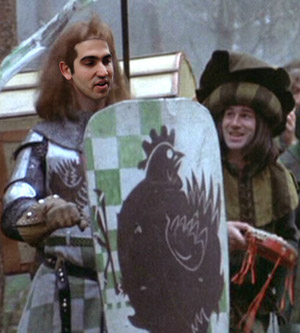
Bravely bold Sir Robin
Rode forth from Camelot
He was not afraid to die, oh brave Sir Robin
He was not at all afraid to be killed in nasty ways
Brave, brave, brave, brave Sir RobinHe was not in the least bit scared to be mashed into a pulp
Or to have his eyes gouged out and his elbows broken
To have his kneecaps split and his body burned away
And his limbs all hacked and mangled, brave Sir RobinHis head smashed in, and his heart cut out
And his liver removed, and his bowels unplugged
And his nostrils raped, and his bottom burned off
And his penis…Brave Sir Robin ran away,
Bravely ran away, away
When danger reared its ugly head,
he bravely turned his tail and fledYes, brave Sir Robin turned about
And gallantly, he chickened out
Bravely taking to his feet
He beat a very brave retreatBravest of the brave, Sir Robin
He is packing it in and packing it up v And sneaking away and buggering up
And chickening out and pissing off home,
Yes, bravely he is throwing in the sponge
The Discovery Institute, once again, ran away from a fight. A day before the Texas board of education started hearings on science textbook adoptions, and three days before the final vote, the Disco. ‘tute pre-emptively declared defeat.
[Disco. VP] Stephen Meyer…expressed concerns that proposed textbooks would “leave students in the dark about contemporary mainstream scientific controversies over Darwinian evolution. Students should be trained to think independently, rather than be drilled in rote fashion. Unfortunately, because Texas is a major purchaser of textbooks, the Board’s action may have an adverse impact on science education across America for years to come.”
Experts appointed by the Board reviewed the proposed texts, but textbook publishers failed to implement important suggested changes.
Casey Luskin, an attorney and science education expert at Discovery Institute, expressed similar concerns to those of Meyer. “The Texas State Board of Education appears to be backtracking on its own previous commitment to teaching young people to think critically,” explained Luskin. “That will please Darwin-only [sic] activists who seek to censor [sic] the very real [sic], serious [sic], and fascinating [sic] scientific debate about evolution.”
“But what about young people?” Luskin asked. “Sadly, students will pay the price. Excellence in science education is poorly served by a capitulation to dogma.”
Luskin, Meyer, and other Disco. ‘tute staff were out in force at the 2009 science standards hearings, and they declared that outcome to be a “big win” and a “huge victory”. NCSE’s take was only slightly less pessimistic. But they were nowhere to be seen at the 2011 hearings on science textbook supplements, or at this September’s hearing on science textbooks. And they seem to have surrendered without firing a shot in this last hearing.
It’s hardly the first time the Discovery Institute engaged in some high-profile sponge-throwing-in. In 2005, as the Kitzmiller v. Dover case moved toward trial, the Discovery Institute had several of their fellows listed as expert witnesses for the defense. As the plaintiffs’ attorneys waited in the conference room to depose John Angus Campbell, they got the call that the Disco. ‘tute was buggering off and chickening out, and that Campbell wouldn’t be appearing at all, and neither would several other DI Fellows, including Bill Dembski (who nonetheless demanded payment for his services).
Michael Behe, to his credit, did testify at the trial (disastrously), but the other witnesses from the Disco. ‘tute shimmied their way out of the trial. They claimed that the split with the defendants emerged from a dispute over whether DI witnesses would be allowed to bring their own lawyers to depositions in addition to the defendants’ lawyers. But it was transparently obvious to observers that they realized that the Dover school district’s policy was doomed to legal defeat, and were looking for a raft on which to depart from the sinking ship.
Now in Texas, they seem to have done the same thing. Having invested a lot of effort to weaken the state’s science standards, a first step toward weakening its textbooks, the Discovery Institute abandoned the battle at the first sign of trouble. But I’m still here, along with a host of supporters of the integrity of science education, and as far as we’re concerned, this fight won’t be over until the last vote on Friday. (PS: It's over. We won.)

